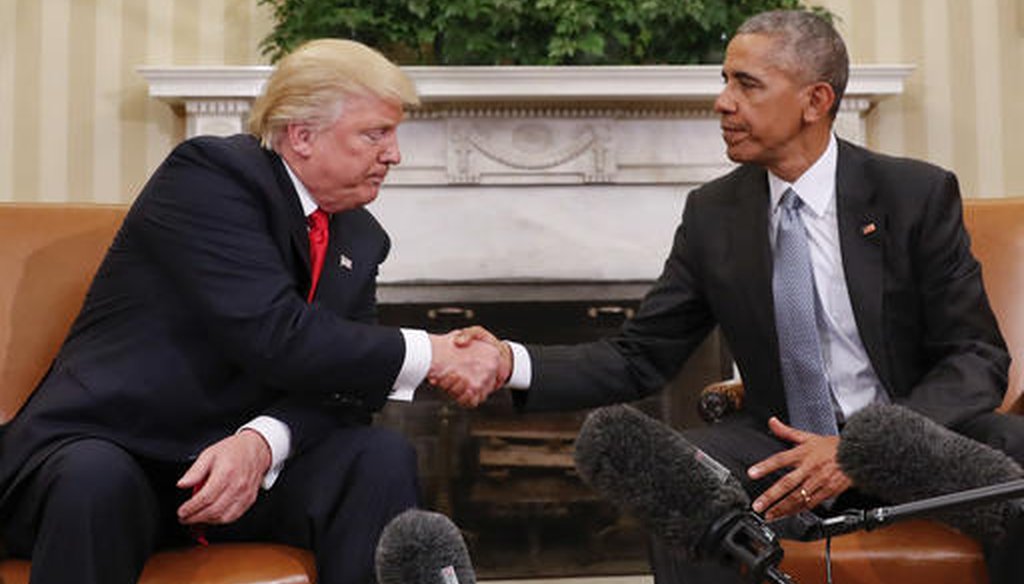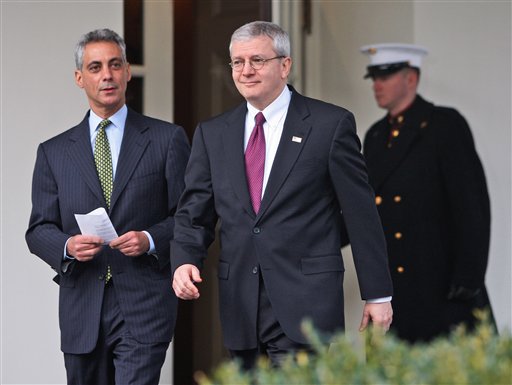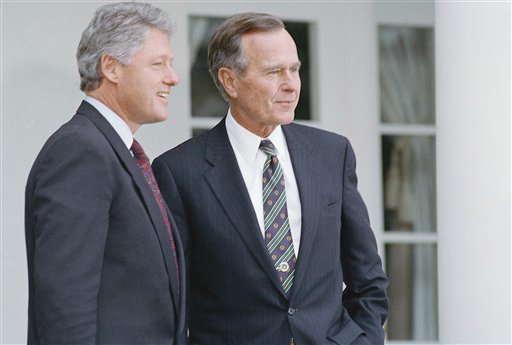Stand up for the facts!
Our only agenda is to publish the truth so you can be an informed participant in democracy.
We need your help.
I would like to contribute

President Barack Obama and President-elect Donald Trump shake hands in the Oval Office on Nov. 10, 2016. (AP)
If Your Time is short
• Presidential transitions are governed by a mix of law and tradition. No president in recent memory has flouted the process to disrupt the transition more than Donald Trump.
• Among the biggest challenges created by a shortened transition period will be marshaling efforts to combat the coronavirus pandemic and protecting the country from national security threats.
• Government experts say that the longer the delay runs, the harder it will be for Biden to start an effective administration.
President Donald Trump continues to maintain that he won the 2020 presidential election, despite all evidence to the contrary. And he is continuing to block the transition to a new government headed by Joe Biden on Jan. 20.
What he’s doing is certainly not normal for a departing president. But is it allowed? What is the law governing presidential transitions? What is governed by tradition? And how will a delayed transition affect the response to the coronavirus pandemic and national security?
Here are answers to these and other questions, based on our conversations with experts on the federal government and the transition process.
The primary law governing transitions, the Presidential Transition Act, took effect in 1964. It has been updated on several occasions, including laws enacted in 2010, 2016 and 2020.
The law defines the terms "president-elect" and "vice-president-elect" as "the apparent successful candidates for the office of President and Vice President, respectively, as ascertained by the Administrator following the general elections held to determine the electors of President and Vice President."
This language triggers the "expectation that the administrator of the General Services Administration will make a common-sense decision about the election outcome," said Paul C. Light, a professor at New York University’s Robert Wagner School of Public Service. Once that decision is made, the legal basis for "the infrastructure of support" for a presidential transition is in place, Light said.
The president-elect and his or her team have approximately 11 weeks between Election Day and Inauguration Day to organize the new administration and prepare to assume national security and homeland security responsibilities from the incumbent, among other tasks, according to a Nov. 13 Congressional Research Service report.
In general, presidential transition activities are coordinated by the GSA and the White House Office of Management and Budget. Once the president-elect and vice president-elect have been "ascertained" by the GSA, federal officials are allowed to provide the transition team with facilities, funds and services to prepare for the new administration. The money can be spent on salaries, consultants, office supplies, travel expenses and government aircraft.
The agency’s current administrator, Emily Murphy, has not signed the required ascertainment document yet.
"The administrator is striving to adhere to the language and intent of the law, as well as precedent," GSA spokeswoman Pamela Pennington told PolitiFact. "Please note that the law provides no process or standard by which ascertainment is made."
Based on the wording of the law, Murphy’s delay may be legally defensible, Light said.
However, he said the process hinges on good faith, which is in short supply right now.
"Trump's interference and threats have poisoned the cooperative relationship that has long marked the process, even after bitter campaigns such as 1980, when Reagan bested Carter for the presidency," Light said.
Josh Bolten, the chief of staff to outgoing President George W. Bush, meets with Rahm Emanuel, the chief of staff-designate to President-elect Barack Obama, on Jan. 13, 2009 at the White House. (AP)
Before the 1964 law was enacted, "norms and traditions guided the way," said Kathryn Dunn Tenpas, a senior fellow at the Brookings Institution who has studied transition issues. And those traditions continued even afterward, experts said.
Usually, this process has been smooth. James P. Pfiffner, an emeritus professor in George Mason University’s Schar School of Policy and Government, recalled that when he was working with the federal Office of Personnel Management in 1980, the incoming transition team for Ronald Reagan was given rooms in his agency’s headquarters and briefing books the day after the election.
Even the transition after the 2000 election, which was surrounded by uncertainty due to the close race between George W. Bush and Al Gore, worked as well as could be expected, he said. The outgoing Clinton administration had been providing Bush with classified briefings for weeks well before GSA ascertained the Bush victory following the Supreme Court decision that halted recounts, Pfiffner said.
The transition between Bush and Barack Obama in 2008, which came amid a financial crisis, "was the gold standard for the outgoing administration facilitating the transition," Pfiffner said.
Trump’s refusal to follow his predecessors in a smooth transition process is a sharp break with this history, experts agree.
"What we have lost so far is the goodwill that most incumbent administrations extend to the incoming administration of the other party," Pfiffner said.
Experts said the Biden transition team would ideally be speaking to high-ranking officials in all of the federal agencies that will play a role in vaccine development and distribution, including the Department of Health and Human Services, the Centers for Disease Control and Prevention and the Food and Drug Administration. But Trump has explicitly told administration officials not to cooperate with the Biden advisers until the GSA administrator recognizes the election result.
"Biden needs to know what decision points are coming up, and the challenges the outgoing administration foresees," said Max Stier, president and CEO of the Partnership for Public Service, a nonprofit that runs a Center for Presidential Transition that advises on best practices.
The Biden team has taken the steps it can to reach out to health care experts, forming a COVID-19 task force and speaking to local public-health officials. In addition, some information is public and thus available to the Biden team, including the summaries of states’ vaccine distribution plans.
However, other details are not public, such as foreseeable problems outlined in these state plans. For instance, many city and county health departments lack the funding needed to implement mass vaccination, despite federal guarantees of free vaccinations.
Biden’s coronavirus advisers have told reporters that the incoming administration plans to begin distributing vaccines after he is inaugurated, but they say the process would be easier if they could collaborate with Trump administration officials now.
"There is valuable information inside the administration that is held by career officials, by political appointees and others who have been working hard on the COVID response for the last year," said Dr. Vivek Murthy, a former U.S. surgeon general and one of Biden’s advisers. "We need to talk to those individuals. We need to work together with them. And if we do that, then I am confident we can come up with the best possible plans for the country on January 20."
Citing the lack of ascertainment of Biden’s victory, the Trump administration has prevented Biden from receiving daily intelligence briefings like the one Trump receives, and that Biden will receive once he’s inaugurated.
This is a break with tradition. Compare it with Bush’s cooperative impulse in turning over the reins to Obama, which was shaped by the shortened transition period Bush had experienced in 2000.
"The 9/11 Commission specifically recommended adjustments to the transition process so that the country would be in a less vulnerable position during the interregnum," Tenpas said. "Denying the president-elect access to intelligence could be quite problematic."
One of the problems stemming from a delayed transition is that official FBI background investigations for nominees’ security clearances can’t begin. As a result, thousands of political appointees can’t begin the confirmation process, causing delays that could leave the incoming administration’s departments rudderless for months.
"In the ordinary course of business, it’s a slow-moving process, but every day you lose in a delayed transition makes it that much harder," Stier said.
Another potential nightmare, experts say, is that the federal budget runs out in December. Congress will have to reach agreement on future spending levels, or the government could shutdown.
"The lack of focus on this issue could easily lead to a government shutdown," said Terry Sullivan, a professor at the University of North Carolina and an expert on the presidency.
President George H. W. Bush and President-elect Bill Clinton at the White House on Nov. 18, 1992. (AP)
Electoral votes are formally counted in a joint session of Congress on Jan. 6 — two weeks before the inauguration — but the results should be known publicly on Dec. 14, when the electors cast their votes in state capitals. Assuming Biden wins 270 votes, the announcement of the electoral voting results would give the GSA even less of justification to avoid ascertaining Biden’s victory.
After Dec. 14, the problems for the incoming administration will accumulate daily, experts said.
"Things will progressively get worse the longer Trump holds out and insists that he won the election," Pfiffner said. "The closer this gets to the inauguration, the more dangerous it becomes."
He could, but it might not help, experts said.
A legal challenge takes time to wend its way through court, meaning the situation may resolve itself before a court could intervene, Stier said. In addition, he and others said, the law refers to the "apparent" winner, which gives the Trump administration enough linguistic leeway to make a defensible argument in court.
The one positive note for the Biden team is that Biden, a former vice president and six-term senator, can probably handle a shortened transition better than a less-experienced president-elect.
"Biden has been out of the White House only four years, and he has recruited a number of experienced experts that will enable him to hit the ground running, despite President Trump’s attempts to undermine him and thwart his transition into office," Pfiffner said.
After Biden met online with governors Nov. 19, a reporter asked Biden why he doesn’t sue over the transition issue. Biden said he hadn’t ruled it out, but he said it would take a lot of time and would not speed up the process.
"I am hopeful that I’m going to be able to get cooperation from our Republican colleagues in the Senate and the House, as well as the governors to build a consensus as to how we proceed when we do," he said.
Our Sources
Rev.com, Joe Biden & Kamala Harris COVID-19 Press Conference After Meeting with Governors Transcript, Nov. 19, 2020
Rev.com, President-elect Joe Biden roundtable with healthcare workers, Nov. 18, 2020
Congressional Research Service, Presidential Transition Act: Provisions and Funding, Nov. 13, 2020
PolitiFact, Trump, with help, is trying to sue and tweet his way to a second term. Could it work? Nov. 11, 2020
David Barram, General Services Administration, Testimony, Dec. 4, 2000
Politico, Biden Covid advisers say transition delay hurts pandemic prep beyond vaccines, Nov. 17, 2020
New York Times, Missing From State Plans to Distribute the Coronavirus Vaccine: Money to Do It, Nov. 14, 2020
Operation Warp Speed, Fact sheet, 2020
CNN, Former GSA administrator: 'It's clear' we should recognize Biden as the President-elect, Nov. 19, 2020
NPR, Biden's COVID-19 Advisers Plead For 'Ascertainment' So They Can Plan For January, Nov. 17, 2020
PolitiFact, Trump, with help, is trying to sue and tweet his way to a second term. Could it work? Nov. 11, 2020
Email interview with Pamela Pennington, General Services Administration spokesperson, Nov. 19, 2020
Interview with Adriane Casalotti, spokesperson for the National Association of County and City Health Officials, Nov. 19, 2020
Interview with Max Stier, CEO of the Partnership for Public Service, Nov. 19, 2020
Email Interview with Terry Sullivan, a professor at the University of North Carolina and an expert on the presidency, Nov. 19, 2020
Email interview with Paul C. Light, professor at New York University’s Robert Wagner School of Public Service, Nov. 18, 2020
Email interview with Kathryn Dunn Tenpas, senior fellow at the Brookings Institution, Nov. 18, 2020
Email interview with James P. Pfiffner, emeritus professor at George Mason University’s Schar School of Policy and Government, Nov. 19, 2020



































